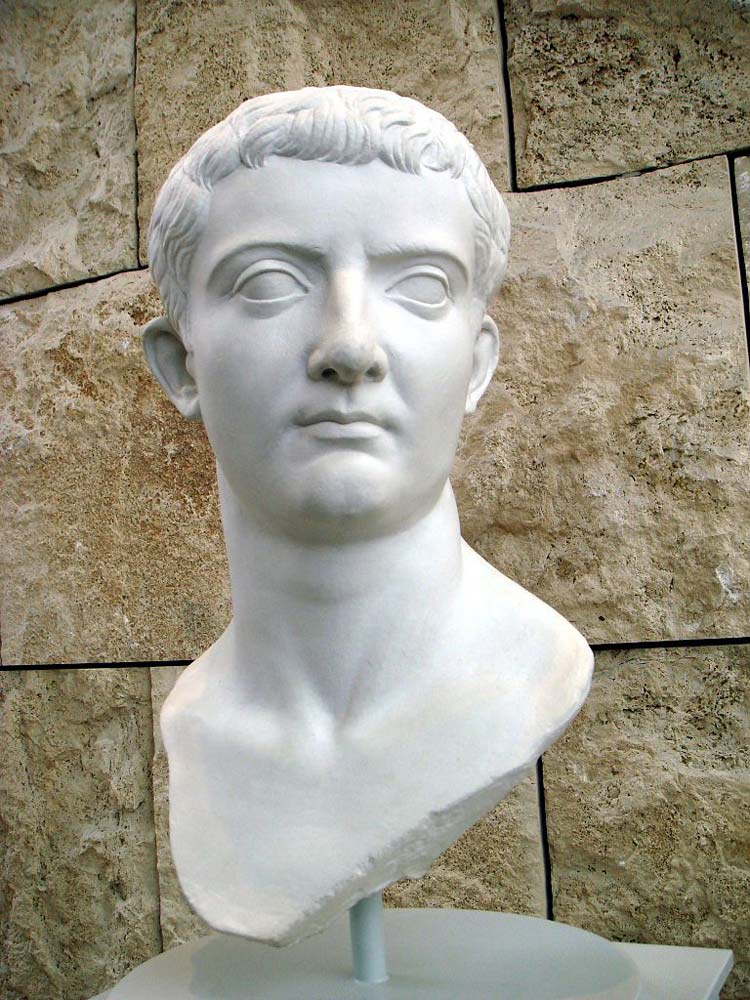| Tiberius | |
|---|---|
 |
|
| 2nd Roman Emperor | |
| In Power | Sept. 18, 14 A.D. – Mar. 16, 37 A.D. |
| Born | Nov. 16, 42 B.C. Rome |
| Died | Mar. 16, 37 A.D. (at age 77) Misenum |
Tiberius (42 B.C. – 37 A.D.) was the 2nd Roman emperor and a highly successful soldier. He was born on November 16, 42 B.C. in Rome to Livia Drusilla and Tiberius Claudius Nero. In 39 B.C. his mother divorced Nero and married Augustus, making Tiberius Octavian’s step-son. Tiberius was the first outsider to take over the system which had been set up by Emperor Augustus.
Critics say that he was not highly skilled at stabilizing Augustus’ Empire, but this remains as a debatable topic. All in all, he was considered a last resort in succeeding Augustus. Moreover, his general lack of concern in the Empire and mental imbalance resulted in a highly incompetent reign.
Early Life and Accomplishments
Little information is known about Tiberius’ early life. His first public appearance was in 32 B.C. at the age of 8, where he read the eulogy of his biological father. Emperor Augustus got very ill in 23 B.C. and his imminent death exposed the Roman Empire to chaos again. Among those who were selected to be the potential heirs included Agrippa, Marcellus, Tiberius, and his brother Drusus. Augustus directed Tiberius to join politics in 24 B.C.
 Despite being 17 years old at that time, Tiberius got a position of quaestor (an elected/appointed official). He also received the right to stand for election as praetor (title given to a man serving in one of 2 official capacities in the government of the Ancient Rome) and consul, 5 years in advance of the legal age. In 19 B.C., he married to Vipsanius Agrippina, the daughter of Marcus Agrippa, one of Augustus’ great generals. He was appointed as governor of Gaul in 16 B.C. and as first consulship in 13 B.C.
Despite being 17 years old at that time, Tiberius got a position of quaestor (an elected/appointed official). He also received the right to stand for election as praetor (title given to a man serving in one of 2 official capacities in the government of the Ancient Rome) and consul, 5 years in advance of the legal age. In 19 B.C., he married to Vipsanius Agrippina, the daughter of Marcus Agrippa, one of Augustus’ great generals. He was appointed as governor of Gaul in 16 B.C. and as first consulship in 13 B.C.
 When Marcus died in 12 B.C., Augustus forced Tiberius to divorce Vipsanius and marry Marcus’ widow, Julia (Augustus’ only daughter). Tiberius became very frustrated by the forced marriage. He would still see Vipsanius in secret from time to time.
When Marcus died in 12 B.C., Augustus forced Tiberius to divorce Vipsanius and marry Marcus’ widow, Julia (Augustus’ only daughter). Tiberius became very frustrated by the forced marriage. He would still see Vipsanius in secret from time to time.
Eventually, the affair between Julia and Tiberius was known by the public, forcing him to retire to Rhodes. Augustus did not like the actions which Tiberius had taken and sacked him from all positions of power. At that time, most of Augustus’ potential heirs had already died. As a last resort, Tiberius was recalled to Rome where Augustus restarted to build Tiberius’ power. Eventually, both men shared power equally, with the assumption that after the death of Augustus there would be a smooth power transfer.
The Succession
After the death of Augustus in 14 A.D., the senate assembled so as to transfer power formally and entirely to Tiberius. Augustus’ will that had named Tiberius as the successor was read. This proved to be a difficult issue to solve, since Tiberius pretended not to be interested in succeeding Augustus and assuming the sole power. The Senate became confused by the situation, and at one point one of the senators asked Tiberius whether he was planning to become the Emperor or not.
In the end, Tiberius gave in to the request of the Senate and took all regal titles except Augustus. At that time, mutinies had started to sprout in the provinces especially in Rhine area. Tiberius was forced to introduce taxes and a reduction in public spending, since the public treasury had little money. This made Tiberius unpopular very rapidly.
Tiberius Reign
Although Tiberius had a stale relationship with the Senate and there were rising mutinies in Rhine region, his first few years of reign went well. He favored Germanicus (his adopted son and Augustus’ great-nephew) over Drusus (his biological son) for the succession. It is believed that, Tiberius wanted to follow Augustus’ plans for the succession.
Germanicus was granted consular power by the emperor and became a commander of the major military zone in Germany where he crushed one of the rebellions. In 17 A.D., Germanicus was recalled to Rome, becoming a consul with the emperor. Later, he was sent to the east where he died in 19 A.D. This prompted Tiberius to start grooming his son, Drusus, as the successor to the throne.
Drusus died in 23 A.D., throwing open the issue of the succession. In an attempt to find out the murderer of Drusus, 63 treason trials took place. At that moment, Tiberius was relying heavily on Lucius Sejanus who was the head of the imperial bodyguards. However, in 23 A.D. Sejanus started to undermine Tiberius after embarking on a relationship with Drusus’ wife (Livilla). After the death of Drusus, Sejanus sought permission from the emperor to marry Livilla. Tiberius did not grant the permission but this did not Sejanus discourage from pursuing his quest to gain power.
The Fall
Sejanus was a determined man and in 26 A.D., he managed to persuade the emperor to retreat to his villa in Capri. Sejanus was left in charge and was granted all Tiberius’ influence and command of the armies. By 31 A.D., Sejanus had become betrothed to Livilla’s daughter and had managed to do away with a few members of the royal family. His connection to the Imperial line was now assured. Later on in that year,
Tiberius sent a letter to the Senate and denounced Sejanus as a traitor. He also accused him of Drusus’ murder and wanted him to be arrested. The Praetorian Guard (Imperial bodyguards) arrested Sejanus immediately. Shortly after his arrest, Sejanus was executed and an entanglement of treason cases followed. People linked with Sejanus were tried and most of them were executed.
The End of the Reign
After Sejanus’ execution, Tiberius drew his will where he left Gemellus and Gaius as joint heirs. However, it was obvious that Gaius would be the one to succeed Tiberius. This was due to the fact that, Gemellus was an infant at that time and Tiberius also suspected that Gemellus was Sejanus’ adulterous child. By that time, the emperor was still living in his villa but he still communicated with Rome through correspondence.
The administration of Augustus was therefore running the empire. There were many treason trials during the last few years of Tiberius reign. Some critics say that, he enjoyed seeing people being tortured and executed. In 37 A.D., Tiberius got sick when travelling to Campania. He died on March 16, 37 A.D., in his Misenum villa.
The cause of death still remains uncertain up to date, with some claiming that he was smothered with a cushion on his death bed, while some claim that Tiberius died of old age. After his death, Tiberius was succeeded by Gaius. Throughout Tiberius’ reign, Rome did not participate in any wars. Tiberius was therefore devoted in governing the empire and as a result he left a full treasury and a good economy.